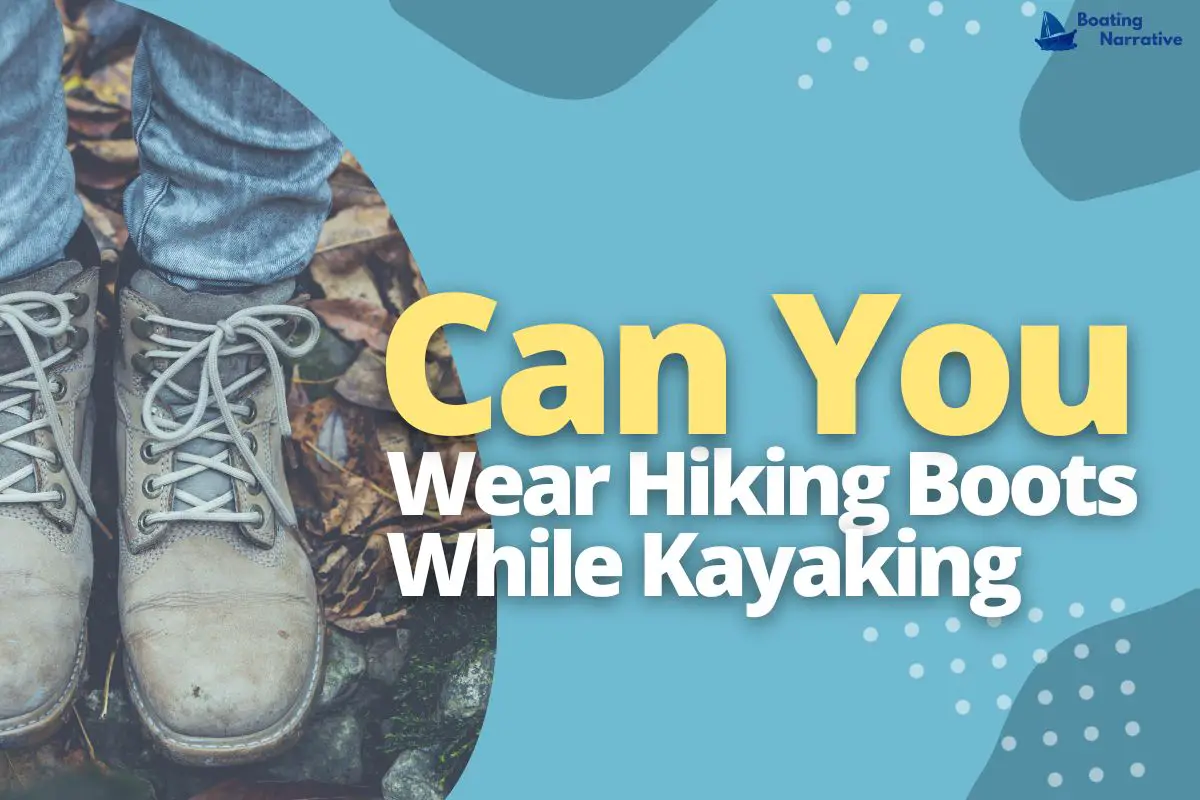If you’re an avid outdoors person, you may be wondering if you can get away with wearing your hiking boots while kayaking. After all, they’re both water activities, right?
Wrong.
Hiking boots are not meant for wet environments and can actually do more harm than good when worn while kayaking. In this blog post, I’ll explain why and provide some alternative footwear options that are better suited for the job.
Key Takeaway’s
- Wearing hiking boots while kayaking is not recommended as they can cause you to lose balance and tip over.
- Hiking boots also provide no protection from the cold water, which can lead to hypothermia.
- Wearing neoprene or water shoes is a better option as they will keep your feet more stable and warm.
- If you do wear hiking boots while kayaking, be sure to secure them well, so they don’t come off and float away.
- Always wear a life jacket.
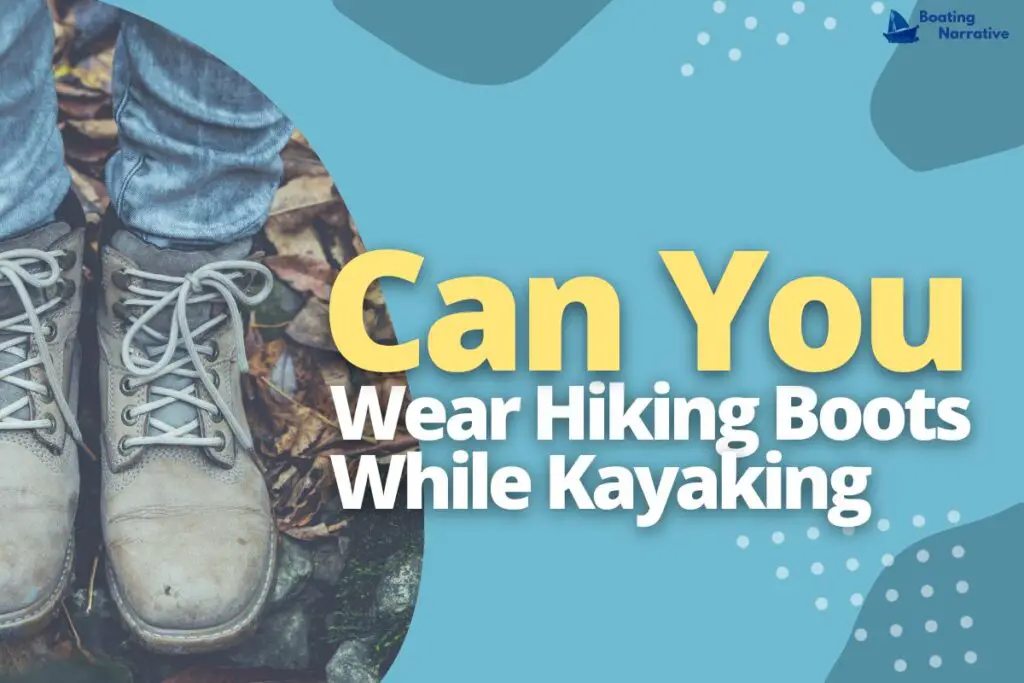
Here’s The Answer To Can You Wear Hiking Boots While Kayaking?
The quick answer is that no, you should not wear hiking boots while kayaking. Hiking boots are not designed to get wet, and they will significantly increase your risk of injury if you wear them while kayaking.
There are a few reasons why you should not wear hiking boots while kayaking.
- Hiking boots are not designed to get wet. They’ll take on water and weigh a lot, which will make it difficult to paddle and could lead to fatigue.
- Hiking boots can be very slippery when wet, which increases your risk of falling out of your kayak.
- Hiking boots provide less protection than closed-toe water shoes or sandals, so you are more likely to hurt yourself if you wear them while kayaking.
If you want to wear footwear while kayaking, choose closed-toe water shoes or sandals that are designed to get wet. These shoes will protect your feet and help you grip the pedals or paddles better.
Wearing Hiking Boots While Kayaking Is Not Recommended.
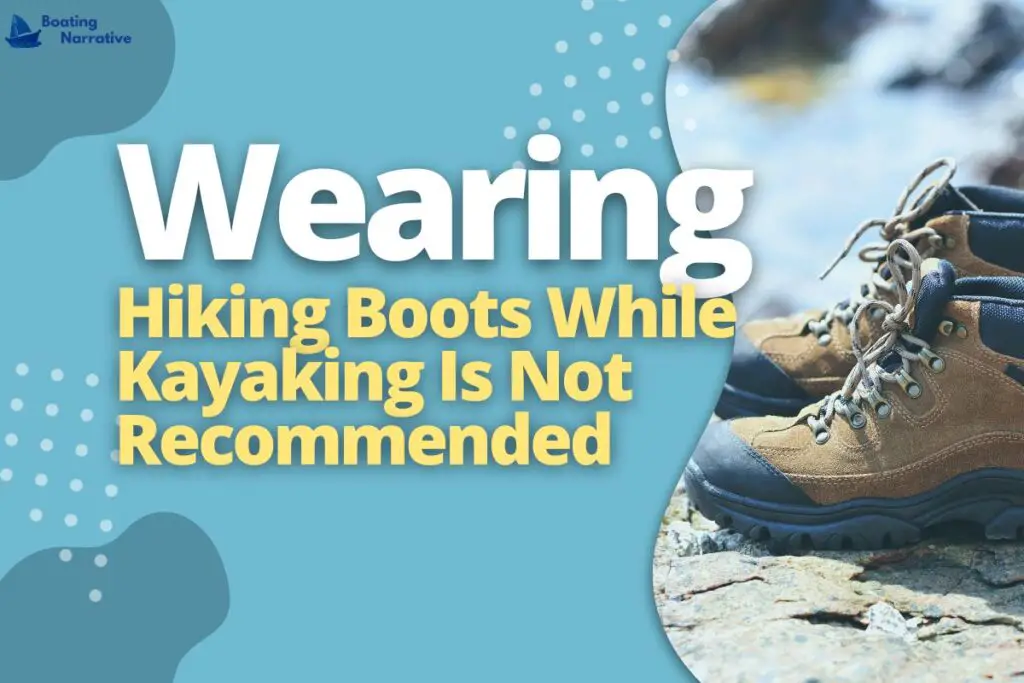
Hiking boots are not designed for kayaking. They can fill with water, making it difficult to paddle, and they may weigh you down, causing you to tip over or hit your head when moving around in the water.
If you decide that hiking boots would be a good option for your next trip, make sure they have removable insoles so that you can take them off if needed and replace them with regular sneakers if necessary.
Hiking Boots Also Provide Less Support And Traction Than Dedicated Kayaking Shoes.
Hiking boots are not designed for kayaking and may make it difficult to keep your footing in the kayak. They have less support, traction, and grip than dedicated kayaking shoes.
The heavyweight of hiking boots can also cause fatigue, especially when carrying them over long distances.
In addition to these concerns with how they fit while paddling, you should also be aware that hiking boots will not protect your feet, as well as a dedicated pair of rubber soles, would if you were going into slippery water or mud flats on a river bank.
If You Do Choose To Wear Hiking Boots While Kayaking, Be Sure To Secure Them Well.
If you choose to wear hiking boots while kayaking, be sure to secure them well so they don’t come off and fill up with water. This can be a major safety hazard, as well as causing discomfort and ruining your day.
There are a few different ways to secure your boots while kayaking. One is to stiffly tie the laces, which attach your boot to the foot itself. If you’re worried that your boot will come off and fill with water, this is a decent choice.
You can also use straps to fasten your boots to the kayak’s foot pegs. If you’re concerned that your boots will slide around or get in the way while you’re paddling, this is an excellent alternative.
Whichever approach you decide on, make sure to practice using it before setting sail. You don’t want to discover that your boots aren’t fastened in the middle of a paddle.
Dedicated Kayaking Shoes Are Designed to Drain Water And Provide Good Traction And Support.
If you are looking for the best way to protect your feet, then a dedicated kayaking shoe is the way to go. Dedicated kayaking shoes will drain water and provide good traction and support, making them a better choice than hiking boots for paddling.
Dedicated kayak shoes have drainage holes that allow water to flow out of the shoe more quickly than other types of footwear.
This allows you to have more comfort when paddling because there’s less pressure on your feet as they absorb shock from hitting rocks or logs in the water while also maintaining proper balance throughout any activity (from standing up straight while standing on shore).
You May Also Want To Consider Wearing A Pair Of Neoprene Socks Over Your Hiking Boots To Help Keep Them Dry.
If you plan to kayak while wearing hiking boots, it’s best to keep them as dry as possible. Water can seep into the boots and make them heavy, which makes for a less comfortable ride.
However, if you have a pair of neoprene socks on over your hiking boots, this will help keep both the water from seeping in and your feet warm and dry.
If you’re someone who likes to go kayaking and hiking, you may want to consider wearing a pair of neoprene socks over your hiking boots. This can help keep them dry while you’re out on the water.
Are There Any Benefits to Wearing Hiking Boots While Kayaking?
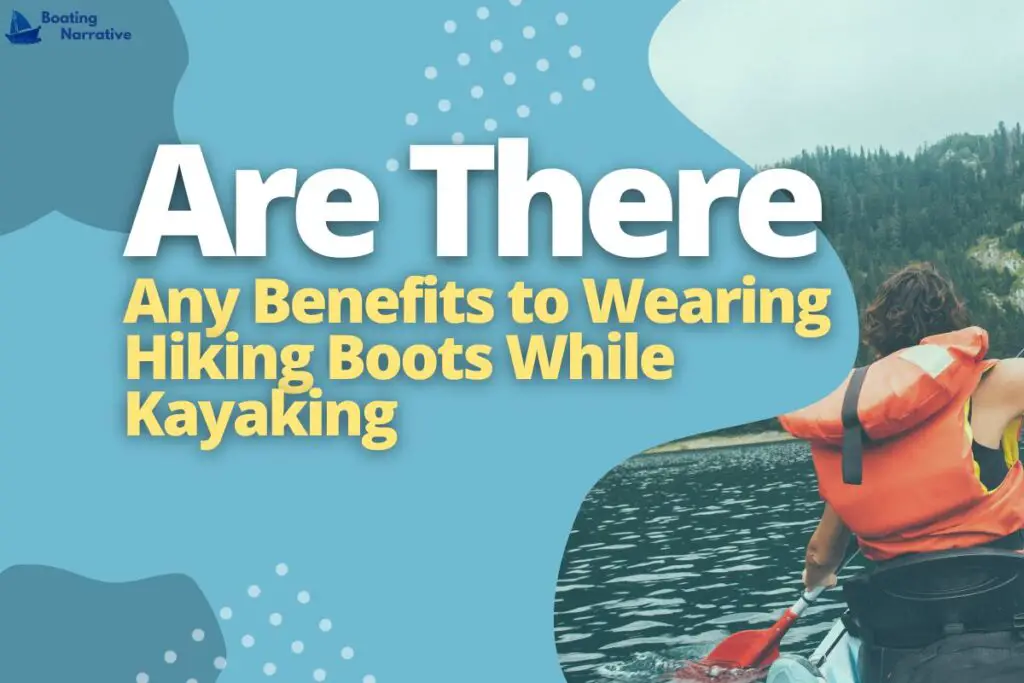
As an avid kayaker and hiker, I often get asked if there are any benefits to wearing hiking boots while kayaking. While there are some benefits to wearing hiking boots while kayaking, there are certain disadvantages as well, which you should be aware of before deciding whether or not to wear them.
Wearing hiking boots while kayaking can provide more support and stability than shoes or sandals. This is especially beneficial if you are paddling in rougher water or over long distances.
Hiking boots also provide protection from sharp rocks and other obstacles that you may encounter while kayaking.
Additionally, hiking boots are durable—they can last many years with proper care (like regular cleaning).
Will Hiking Boots Protect Your Feet While Kayaking?
The short answer is no. Hiking boots are not designed for the rigors of kayaking and can cause more damage than a dedicated shoe.
In fact, they’re not even made for water. The first problem is that hiking boots aren’t waterproof—they provide less traction than dedicated shoes and do little to protect your feet from debris or rocks in the river.
They also tend to be heavy enough that you won’t want them on long stretches of flat water; if your foot gets wet in a stream with no way of drying it out (or worse yet, if it’s soaking wet), you’ll have trouble keeping up with your kayak partner or getting back on board without taking off one or both shoes first.
Finally, if your foot gets stuck in mud or other soft surfaces while wearing hiking boots and starts sinking down into them (as could happen during an emergency stop).
Then you’ll be at risk of losing circulation around these areas where water has pooled up inside. There’s no way out besides removing those particular pieces themselves—which could lead to further complications down the road.
How Should You Care For Your Hiking Boots After A Day Of Kayaking?
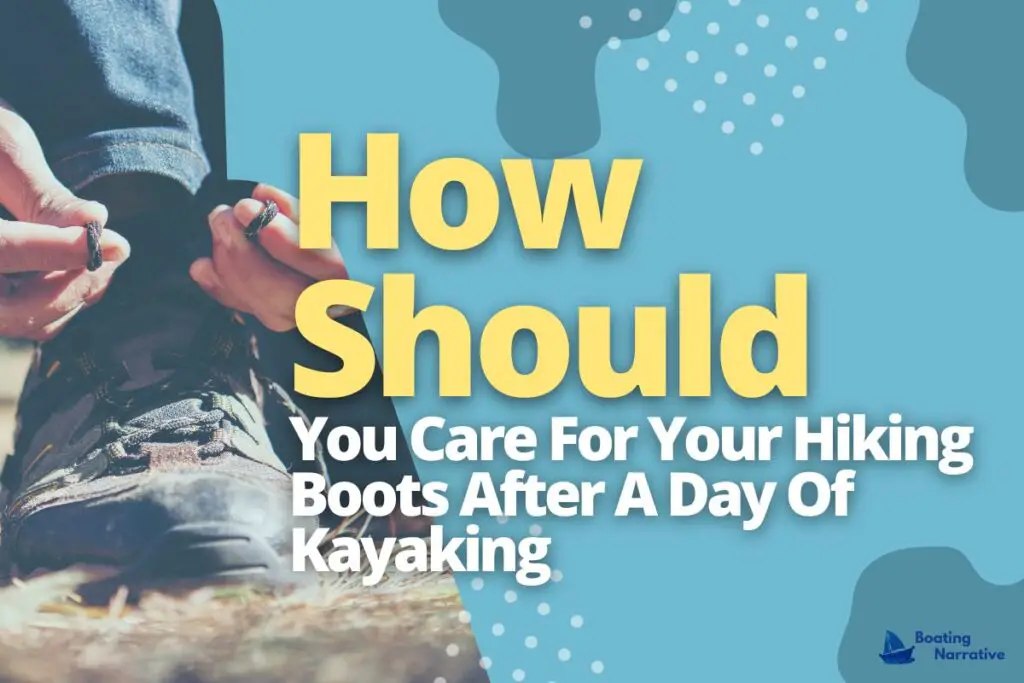
Your hiking boots will be covered in water and dirt after a day of kayaking. To remove this material, you can use a cloth or sponge to wipe away any excess moisture.
If you want to keep things tidy and appealing, it’s important that they are completely dry before putting them back on again.
To ensure that your hiking boots are always ready for action when needed, we recommend storing them in a dry place where there is no risk of becoming submerged in water (for example, under the sink).
This will help keep all of the harmful bacteria from building up inside them over time, as well as keep their appearance fresh.
What Are Some Things to Consider Before Wearing Hiking Boots While Kayaking?
Hiking boots are great for kayaking, but you should always wear them with the proper gear. Here are some things to consider before wearing hiking boots while kayaking:
- The first thing you’ll need is a pair of comfortable and well-fitting hiking boots. Your feet will be kept dry and safe as a result throughout the entire journey. You should also make sure that these shoes fit properly so they don’t cause any discomfort or blisters when worn on long journeys through the wilderness.
- Size-Another important aspect of choosing the right size for your hiking boots is ensuring that they’re not too large or too small (which could lead to pain). Make sure they’re not too tight around your calves either; this could cause chafing if not solved immediately.
Are There Any Risks Associated With Wearing Hiking Boots While Kayaking?
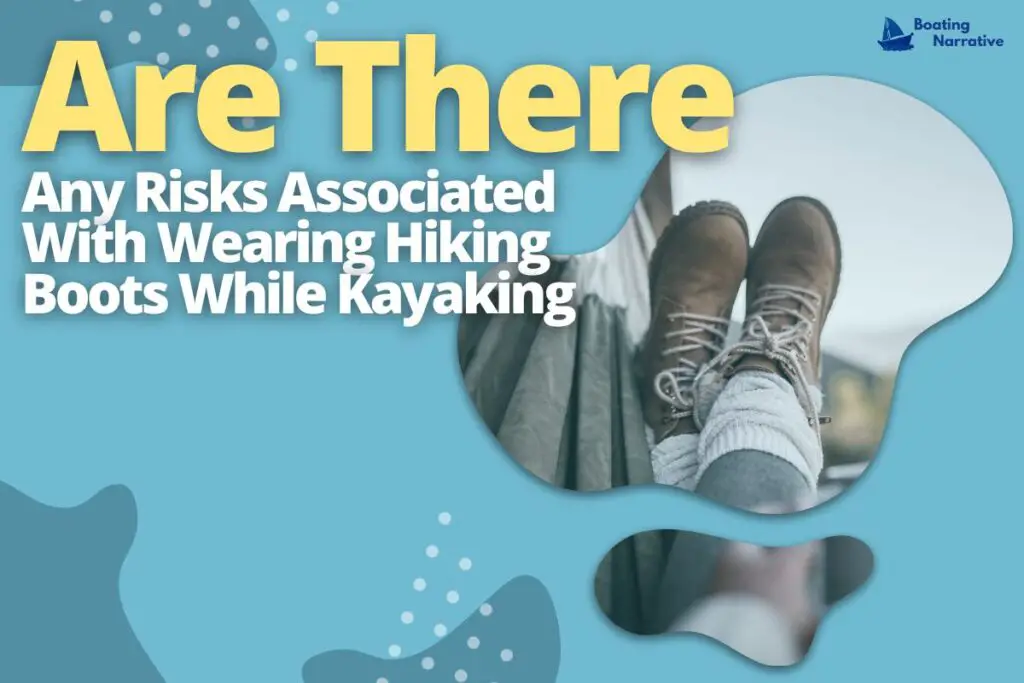
Hiking boots are a great way to keep your feet protected while hiking, but there are some risks to consider while kayaking.
- Hypothermia can result from shivering excessively and becoming too chilly. This can happen if the sun sets while you’re in the water and then doesn’t come out again until later in the evening or overnight. Your body loses heat faster than it can produce it on its own, so if this happens during the winter months when temperatures drop below freezing (0°C), then being exposed for long periods of time could be dangerous for your health.
- Sprained Ankles/Broken Bones: In addition to getting hypothermia from being wet all day long without any protection from getting cold water splashed onto their feet from paddling around too fast with no real padding underneath them, which may cause sprains or breaks, Hikers who wear hiking boots have also reported having sore ankles after awhile because they are wearing bulky footwear like these ones.
Conclusion
No, you should not wear hiking boots while kayaking. Hiking boots are not designed to get wet, and they will make your feet very cold.
Hiking boots are not ideal for kayaking because they are not comfortable and can cause blisters. In addition, they can make it difficult to paddle and can cause you to tip over.
If you are going to wear hiking boots while kayaking, be sure to bring a spare pair of socks and plenty of bandages.
So, there you have it! Wearing hiking boots while kayaking is not recommended, but if you do choose to wear them, be sure to take some precautions.
For more information on kayaking gear and safety, be sure to check out our other articles on our website. And don’t forget to follow us on social media for updates on new articles and tips.

